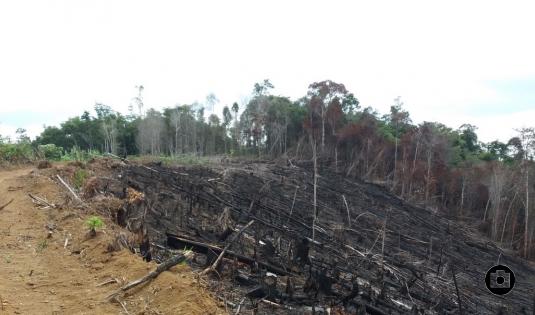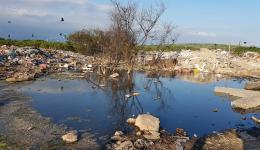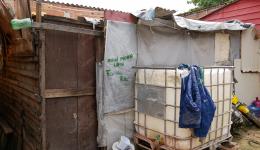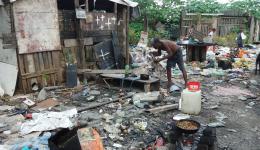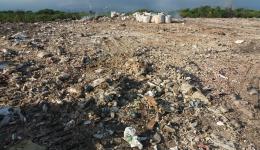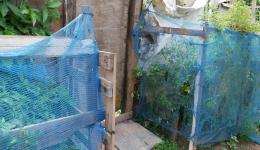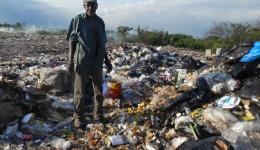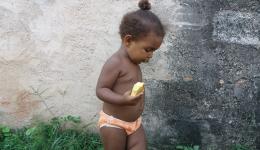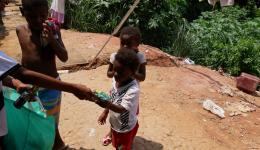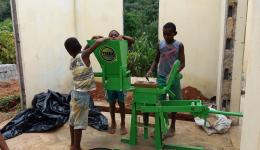Registered Nonprofit
Association for the Support
of Children and Needy
People Around the World
Unterstützung
Education on a garbage dump and Maniok roastery in the rainforest
Mon, April 2nd, 2018 - 8:00pm, written by Alexandra, posted by Frank
Tour report part II - brick pressing machine and manioc roasting plant in the Atlantic rainforest
The second part of the tour takes Christian, Bianca and Alexandra to Nilo Peçanha in the Atlantic Rainforest in northeastern Brazil.
Since August last year Bianca, Cebolinha and their two children, together with Claudia and Açai live in the middle of the wilderness in a rented house under very simple conditions. Besides building up an existence, their goal is to support farmers in the rainforest to find their way back to their "roots".
Brazil's rainforest, the "lung of the earth" has long been exposed to exploitation by poachers and advocates of monocultures. Illegal forest fires are the order of the day. At first, Bianca and her team were astonished and even shocked to find out that much of the old knowledge about plants and animals was no longer accessible to the farmers.
When Cebolinha showed the poor farmers that they don't have to buy salad on the market since there are particularly nutritious and tasty plants right in front of their house, they were astonished, but gladly accepted the advice and are now regularly consuming the oversized, rich green leaves.
Bianca reports that children rashly kill birds from the trees with homemade shooting instruments, because they are in no way aware of the importance of species protection. The diversity of flora and fauna is dwindling from year to year.
Far from blaming them, the poverty of the farmers is to be emphasized here: Some time ago Cebolinha asked the children in the area several times if they had already had lunch and got no answer, just a shamefaced look. A few days later, she learned by chance that the current harvest had been poor so that the children had little or nothing to eat.
Survival is in first line ensured by a plant that grows rapidly and needs little care: manioc, also known as bread root. Along with potatoes and sweet potatoes, manioc or cassava is the most frequently cultivated root vegetable in the world and is a staple food in many parts of the world. As early as the 17th and 18th centuries, it was used in countries such as Indonesia, India, Thailand and West Africa to combat famine.
Manioc can only be eaten after cooking it, as it contains toxic substances, e.g. hydrogen cyanide, which are only destroyed after heating. You can make porridge, bread or cake. In powder form and roasted, it is a popular supplement to almost all meals in Brazil.
Talking to the local farmers we receive an important information:
The farmers bring their harvest to a place several kilometers away from their houses. They bring their manioc root bags to a small roasting plant and pick them up again after grinding and roasting. However, the yield is only 75%, which represents a considerable loss for the families, who have only the bare minimum to live on.
One farmer hesitantly tells that a few years ago he bought a small motor for approx. 200€, with which he planned to start his own roastery. He intended to buy a large pan together with the community to do the roasting himself and thereby have no more loss in yield.
Many farmers did not take part because they were afraid that this plan would not work out and that they would rather lose their investment in a joint roasting plant. "Now my engine is rusted," the farmer sadly reports.
We soon agree on the plan and together define the different steps necessary to build a manioc roasting plant, which will be free of charge accessible and usable for all.
The following four days Christian and Alexandra spend with friends of "Fazenda Saúva" (leaf-cutting ants' farm as Cebolinha, Bianca, Açai and Claudia lovingly call their project), looking for a smithy specialized in the production of machines for a cassava roasting plant. Five different machines for peeling, grinding, roasting, sieving and pressing are ordered and paid for. They can be picked up in two months.
In the meantime, a brick machine is ordered in São Paolo and sent by air freight to the nearest airport in Ilheus. This machine will allow them to produce own bricks. A mixture of red rainforest soil, sand, cement and water, which is produced in an appropriate mixing machine, forms the basis of the manual production of the building material.
The whole team is surprised how good, fast and uncomplicated the device works. In the coming months, the walls of the cassava roasting plant will be built by the farmers themselves. The team around Bianca also wants to build a small school where volunteers give courses for children and adults who want to learn: English lessons for children, courses on sustainable cultivation of organic vegetables and plants in the rainforest, the protection of flora and fauna, dance and sports for children, e.g. capoeira, etc.
As in many other countries of the world, also here the phenomenon of rural exodus is widespread, since young people see no prospects in field and forest work. For many young people, the down-to-earth and very enriching work at the "Fazenda Saúva" is an anchor, a prospect of an early improvement of their own future. With their special way of helping people and animals in the Atlantic Rainforest of Brazil, they are helping to protect untouched nature and to restore together with the inhabitants destroyed areas to bring them back into their natural state.
Sun, March 25, 2018 - 9:40pm, written by Alexandra, published by Frank
Tour report part I - Jardim Gramacho, Rio de Janeiro
In March 2018, FriendCircle WorldHelp visits Jardim Gramacho in Rio de Janeiro for the second time. This time, the team consists of Alexandra, Christian and Bianca.
What originally was a "wetland biotope", considered to be one of the richest plant and nature reserves on earth, the "lawn garden" as one could translate Jardim Gramacho, some 37 years ago turned into the garbage dump of Brazil's second largest city. The constantly spreading and increasing mountains of rubbish became the home and workplace for about 15,000 to 20,000 people.
Due to the contamination of soils, rivers and the Guanabara Bay, in 2012 shortly before the UN Environment and Sustainability Summit "Rio+20" the government declared the dump "closed". At first, this was a shock for the residents affected. Most of them never went to school. Without education there was no work and consequently no income for them.To this day, people are still trying to make their way through with partly creative, partly illegal means. For many, diverted waste remains the basis of a small income. The government promised everyone a certain amount of compensation. However, when talking to the people, we learn that for various reasons many of them never received the money.
...While wandering between marshy garbage heaps, which unfold their vapors in the humid heat, we see people separating shards of glass, metal and plastic parts from organic waste. The stinking environment in which people fight for a living cannot be described in words. Swarms of vultures and every now and then the warning of our companions against poisonous snakes makes our team vigilant. Martha, a middle-aged woman tells us that she has been working here for almost 35 years. She has six children to feed. The father does not acknowledge the family and therefore no support on his part is to be expected.
...A truck arrives. Some people put some money in the driver's hand. The load of rotten fruit and vegetables is poured out. Children hurry to collect the most usable of them, pack them in old plastic bags and load them onto an almost flat wheelbarrow. Most people here don't have the money to buy fresh things from the store.
...Near a hut cobbled together from boards and plastic parts stands a huge canister of white plastic for storing drinking water. The container was originally used for transporting used oil. There's a sign on the door of the little house. In Portuguese it says: "Aqui Mora Uma Familia Feliz", which means: "Here lives a happy family".
...A woman around 80 years old tells us in tears that a few months ago her third child died of a serious illness. She had also to bury her two husbands. Those who grow up and live here on the dump are constantly exposed to toxins and chemicals. Two of her children are still alive. Stooped and short-sighted she leans over the counter of her little shop and reports on further events in her life. "When poverty is everywhere, people take the things they need by force. In my life, I have often had a gun on my head. Then I begged them to take everything, but please let my children and me live. Now everyone in the area knows me and respects me. I stand in the store every day because I need distraction. But there are days like today when I don't want to get up and pray that God should take me home."
Christian, Bianca and Alexandra work for three days in a place that most Brazilian neighbors avoid as much as possible. Before starting, a taxi driver makes sure we want to go to Jardim Gramacho as this is known to be a dangerous area...
Maxwell and José, our closest friends on Jardim Gramacho, got the permission for FriendCircle WorldHelp to explore all areas of the dump with their work to provide support where needed.
The encounters with the inhabitants are touching and instructive at the same time. When poverty hangs day and night like a sword of Damocles over one's own fate and that of the family, the desires expressed are modest: A clean rain barrel to store potable water (for some 200€), some medicine for a child with worms under his skin, a fresh bread ...
Nobody can turn back time and bring back the intact world that existed here 40 years ago. But we feel privileged to touch the marked hands of people who for a long time have been representing those people of Rio de Janeiro who remove the mire of the supposedly "better world".
Since September 2014, when Alexandra, Julia, Henrique, Marina and Alicy had come here for the first time, volunteer teachers have been offering English lessons for children and young people in dilapidated premises. Meanwhile there are eight teachers who also teach different sports and offer courses on how to grow some vegetables in front of the own hut. Many of the children and adults take advantage of this opportunity. For them, the small "school" is a place where they can set goals and plans for the future and are encouraged to do so.
A considerable number of young people here see their future in the drug milieu, because they can "make money more quickly", despite the risk to be the losers one day. To give those who are ready to change their minds or are still BEFORE taking a decision, FriendCircle WorldHelp and its friends at Jardim Gramacho offer a chance, because education is the only way out of this spiral.
After careful consideration it is decided to support the school with further material. Among other things, four computers will be purchased to teach children and young people basic skills. The background to this is that basic computer skills are now required for almost every job, whether in the free economy, in the social sector or in the craft sector.
Many thanks to José, Maxwell and the whole team of volunteers in Jardim Gramacho. To fight poverty and its consequences is exhausting. Nevertheless, it is worthwhile for every child and every adult, who is given the opportunity for a worthwhile future.
|
|
